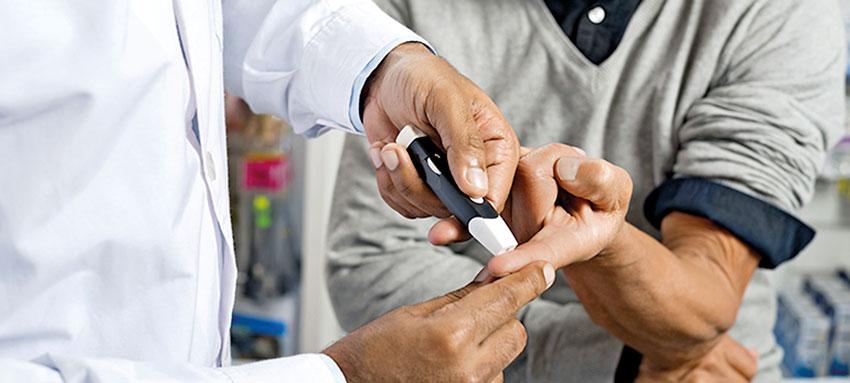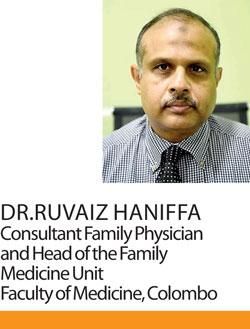12 Jun 2020 - {{hitsCtrl.values.hits}}

 Amongst the mountain of catch-up work left behind by the temporary hold to our lives brought by COVID 19 is the care of patients receiving care for long term health conditions.
Amongst the mountain of catch-up work left behind by the temporary hold to our lives brought by COVID 19 is the care of patients receiving care for long term health conditions.
How should you take care of your chronic illness, whether it’s diabetes or heart disease, during these trying times? We interviewed Dr.Ruvaiz Haniffa, Consultant Family Physician and Head of the Family Medicine Unit of the Faculty of Medicine, Colombo, to get his opinion on the topic.
Why do people with chronic conditions need special care during these times?
According to the WHO, Chronic illnesses like diabetes, hypertension and ischemic heart diseases usually encompass around 60% of mortality and 46% of total disease burden, worldwide. Unlike a wound or an infection that is cured with a course of antibiotics, these conditions require long term attention. The numbers have been on an upward curve for years, and are bound to increase further unless proper care is given.
The emergence of COVID 19 itself is an important reason for the need of increased care for these chronic illnesses as they are at an increased risk from COVID 19 when compared to healthy population.
Many chronic illnesses weaken the immune system of the patients over time. Therefore they are more susceptible to contract COVID 19 when exposed to the pathogen. Their lowered immunity also makes them more vulnerable to complications of COVID 19 like lung failure, heart attacks and Kawasaki disease, states Dr. Haniffa.
But with the whole world shifting its focus on prevention and treatment of COVID 19, care of chronic diseases has taken a back seat during the past few months.
In addition to the disruption to the medical clinics and closure of medical centers in the past months, reluctance of the patients to go to a healthcare institution for the fear of exposure to the pathogen has contributed to sub-optimal care in many people suffering from chronic conditions.
Learning about Red Flag Signs
While it’s wise to avoid unnecessary exposure to crowds and public places, there are instances that you must seek healthcare urgently.
Red flag signs are warning signs pointing out that your condition might be taking a turn for the worse and you need to seek urgent medical care. These disease signs and symptoms differ from illness to illness.Eg:
Diabetes: If a diabetic patient is having frequent hypoglycemic attacks indicating lower blood sugar levels, which usually come in the form of sweating and faintish spells, it is a sign that he needs to seek doctor’s advice. Also, getting up more frequently at night to pass urine, having wounds that are slow to heal and frequent high blood sugar levels in finger prick testing at home using a glucometer are also signs that your diabetes is poorly controlled.
Heart diseases: If you are having chest pains with sweating which does not relieve with time, increasing shortness of breath while walking short distances, are awakening at night due to breathlessness, these are signs that shows that your condition is worsening and need urgent medical care.
Hypertension: Severe headache, blurred vision, chest pain and difficulty breathing are some of the red flag signs of hypertension.
Mental Health is important
People who are taking medication for disorders like depression, bipolar disorder and schizophrenia should continue with their regular medication to avoid inducing a relapse of their conditions.
Additional health and financial worries on top of being deviated from their normal routine during this crisis situation has caused an increased incidence of depression and anxiety amongst the population. Therefore if you are feeling anxious, worthless and/or having thoughts of self harm, it’s important to seek urgent medical care.
Pregnancy
Even though pregnancy is not an illness, a pregnant woman’s immune system is in a weakened state, as an adaptation to carry the fetus to term. Therefore pregnant women belong to the high risk groups of COVID 19. In addition, the unique complications of pregnancy like gestational hypertension, gestational diabetes mellitus may cause serious complications to the mother and the fetus if neglected. Therefore regular follow up of pregnant women is a must during this time period.
Adapting to the new norm
Looking at the predictions of many health experts, it is likely that COVID 19 would stay with us for a while yet, states Dr. Haniffa. Therefore, rather than waiting for the pandemic to vanish overnight so that our lives can get back to what it was before, it would be ideal if we can make adaptations to protect ourselves and the community from the pathogen while moving forwards with life. These changes need to take effect starting on an individual level, going up to the government level.
Government’s role
While a considerable percentage of the urban population has the knowledge and the equipment to cater for their healthcare needs, it’s the rural population that suffers the most. For an example, without the routine clinics to check up on the blood sugar control of diabetic population, they are not receiving the adequate care as many of them cannot afford glucometers. Same goes for hypertensive patients who need regular blood pressure checks.
Establishment of mobile clinics and support groups for common conditions in the grassroots levels and ensuring that they have proper care and resources that the members can share amongst themselves is one way of achieving continuation of care. For an example a small group of diabetic patients living in the same community can be given one glucometer that they can share ensuring that they get adequate blood sugar monitoring.
Using of modern technology like tele-medicine during consultations is another area that is worth giving more attention. Doing so will aid in breeching the gap between healthcare seekers like patients taking treatment for cancer who are in need of essential medical care, yet are unable to reach the necessary facilities and the healthcare specialists.
Family and chronic disease
Even though you may not suffer from a chronic condition, one of your family members or a loved one is likely be living with a chronic illness. Your care and attention towards their health, getting to know their medication, red flag signs and ensuring regular follow up, will likely make a huge positive impact in their lives.
“Family is the best resource that we have towards fighting chronic illnesses. Therefore, you can help fight COVID 19 through increased care and attention towards the health of your loved ones, concludes Dr.Haniffa.
21 Dec 2024 6 hours ago
21 Dec 2024 7 hours ago
21 Dec 2024 21 Dec 2024
21 Dec 2024 21 Dec 2024
21 Dec 2024 21 Dec 2024